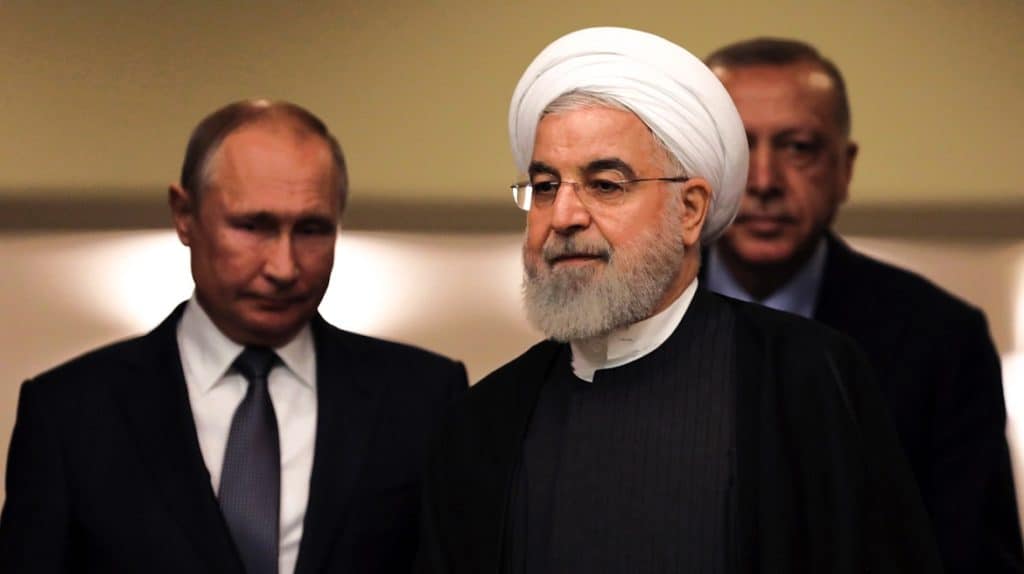By Denis Korkodinov
Russian-Turkish tensions in the Syrian province of Idlib caused serious concern in the international community due to the likelihood of a direct clash between countries. In turn, the so-called Idlib Crisis allows Iran to gain an opportunity to strengthen its position in the region and give an additional impetus to the creation of an anti-American alliance. Due to this, the ayatollah regime against the background of aggravation of relations between Moscow and Ankara poses a serious danger to Turkey.
The dispute over domination between Russia and Turkey is extremely beneficial for the realization of Iranian interests. So, Iran temporarily fell out of the general attention of the international community, which allowed it to significantly advance in terms of restoring its former influence in Syria, Iraq and Lebanon. And now, in the wide media space, Iran, as a rule, becomes a topic for discussion only in the light of the spread of the coronavirus, while the nuclear program and military ambitions of the Ayatollah regime have become of little interest to the target audience.
It is worth noting that as a result of the coup attempt in Turkey in 2016, Recep Erdogan sharply criticized the White House, accusing him of supporting the rebels and harboring Fettulah Gulen. Thus, Turkey pointedly emphasized its need for new international partners, which Tehran and Moscow successfully used.
In August 2016, the international “trio” (Russia, Turkey, Iran) legally formalized their union, which made it possible to implement a number of joint decisions in the field of defense, economy and politics. And now, when Recep Erdogan is forced to pay a visit to Moscow on March 5, 2020, this is perceived not only as a success for Russia, but also for Iran, which intends to advance Ankara’s conditions, which Recep Erdogan is unlikely to refuse.
The goal of Russia is to weaken Turkey’s position in Idlib, while Iran’s goal is to prevent Ankara from weakening Bashar al-Assad’s regime, which remains loyal to the ayatollah regime. Nevertheless, Moscow and Tehran agree that their actions are currently aimed at limiting the scale of Turkey’s military presence in Syria. The ayatollah regime understands that to achieve this goal will only be possible in alliance with a strong player, which at the moment is Russia. Based on this, Tehran intends to play a significant role in acquiring political advantages in Russian-Turkish tensions.
Paying attention to the actions of the Syrian National Army, affiliated with Ankara, their neutralization is a related task of the Iranian leadership, which is interested in the fact that the government troops of official Damascus have a military advantage throughout Syria. Iranian leaders have repeatedly indirectly expressed the view that Russia should provide assistance in the fight against the Syrian National Army. Consequently, the threat from pro-Turkish militants brings Tehran and Moscow closer together.
Iran has not yet publicly advertised its participation in the conflict. Meanwhile, the widespread use by Turkey of shock drones in Idlib, as a result of which the Syrian Arab Army suffers significant losses, is seriously worrying Tehran. In this regard, the ayatollah regime can significantly facilitate the performance of military missions by the Asadites by launching missile strikes at airfields where Turkish drones are based. At least, representatives of the Iranian leadership have already publicly threatened Ankara with the use of ballistic missiles in case of further escalation of the conflict in Syria.
The destruction of Turkish drones is a guarantee for Tehran to realize its own interests in the north-west of Syrian territory. For this reason, ensuring the military superiority of government forces in Idlib is becoming an urgent task for the Ayatollah regime. Moscow does not yet have sufficient capabilities to launch attacks on Turkish bases, as Russia is still determined to maintain an alliance with Turkey, despite tensions. However, Iran, in this case, is completely free in its actions.
(The views expressed in this article belong only to the author and do not necessarily reflect the views of World Geostrategic Insights).







